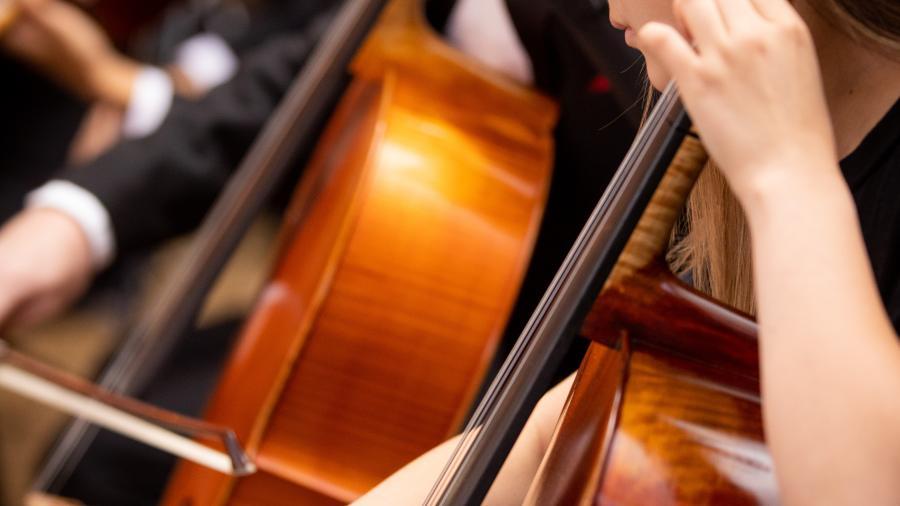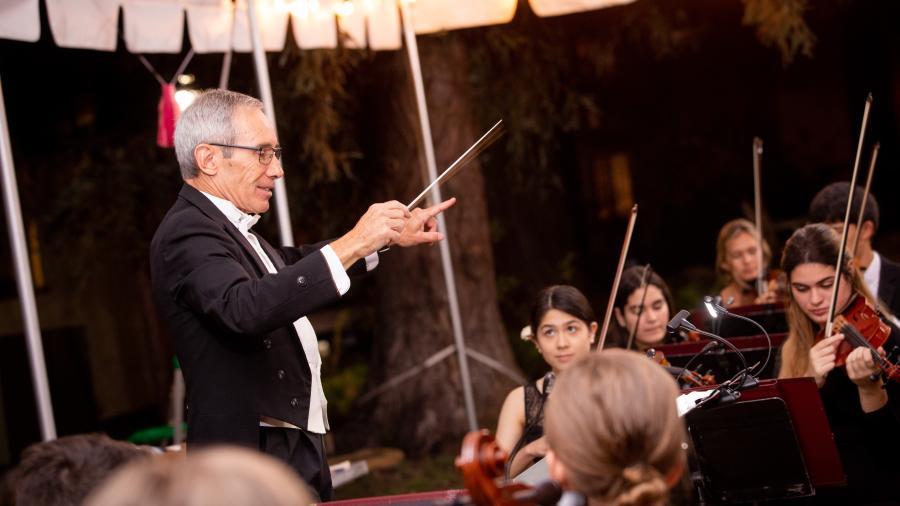Westmont Magazine A Resurgence of the Arts at Westmont

A Season of Seasons
The 2021-2022 Westmont Orchestra presents A Season of Seasons, playing pieces such as Vivaldi’s “Four Seasons” and excerpts from Piazzolla’s “Four Seasons.” After opening with a surprise appearance by the string section at the President’s Weekend in October (see page 20), the Westmont Orchestra performed its fall concert at the Music Academy of the West.
The last concert of the fall semester, Westmont’s Christmas Festival featured marvelous works by great historic composers such as Mendelssohn and Bach as well as several contemporary composers. The festival presented a world premiere by Daniel Gee ’13, assistant professor of music, conductor of the Westmont College Choir, and a composer. The work honors Michael Shasberger, Adams professor of music and worship, who retires in May 2022 after conducting the orchestra and the choir and leading the music department for 17 years. The festival was held in the historic Granada Theatre due to ongoing renovations at their typical venue, First Presbyterian Church. “It’s a great opportunity to perform at Santa Barbara’s leading concert hall in the midst of the arts district,” says Shasberger.
The student musicians appreciate spending time together after a year of uncertainty. “Students this fall seem to have a tremendous sense of gratitude for being able to work together in person,” Shasberger says. “A particular highlight was the orchestra retreat, which we missed last year due to COVID-19. Having some focused time together to meet each other and form community was really wonderful.” At the end of the spring semester, the Westmont Orchestra embarks upon its delayed international tour to Salzburg, Vienna and Prague. “The opportunity to grow deeply with the music we’re performing by visiting the places and cultures where it was created is always an amazing experience,” Shasberger says.
Michael Shasberger will be honored in the Spring 2022 issue of the Westmont Magazine, with a reflection on the Christmas festival at the Granada Theatre.
Exploring Musical Landscapes
The Westmont College Choir also performs a full season in person this year, beginning with the Fall Choral Festival in late October. Participating high school choirs received coaching from one of our choral and voice professors before performing for each other.
“Later in the year, the College Choir’s programming features a range of musical landscapes,” says Daniel Gee, who conducts the choir. “Eric Whitacre’s ‘Cloudburst’ adapts the poetry of Octavio Paz to depict the onset of a powerful desert storm. Morten Lauridsen’s ‘Mid-Winter Songs’ wonders at the coming and going of life’s coldest seasons and moments. Palestrina’s Latin motet ‘Super Flumina Babylonis’ casts the eye of one in exile toward the horizon of promised deliverance.” The Chamber Singers, a smaller choral group, perform “Las Indianas,” Carlos Guastavino’s suite for vocal quartet and piano.
The College Choir opened its Christmas festival offerings with Pavel Chenokov’s “Salvation is Created” and featured music from J. S. Bach’s “Mass in B minor” along with several spirited carol arrangements and Gee’s own composition honoring Shasberger.
Their national tour will take them up the West Coast as far as Seattle. “Singers love performing for new audiences and treasure the memories made in new cities, all in a range of performance contexts,” Gee says. “And who can forget those games we play on the bus to pass the time? Touring, and the memories made there, form a crucial and vibrant part of a choir’s ethos and identity.”
Gee began conducting the choir in 2020 in the midst of the pandemic. As COVID-19 restrictions ease, he says, “I’ve been consistently impressed and inspired by our singers’ adaptability and positive attitudes during this season. With some safety protocols still in place, the singers have learned to make the most of less rehearsal time than normal, picking up the slack when a fellow musician has to stay home due to illness and rolling with the punches when schedules and performance venues change at the last minute. I’ve always believed my goal as a director is not just creating music but cultivating musicians and further developing their talents, abilities and commitments.”
A Comic Foray into the History of Flight
Student actors returned to Westmont’s Porter Theatre for the first time since March 2020 to stage a new play, “Kitty Hawk or Kill Devil,” which explores what it means to live in proximity to greatness. Hannah Kenah wrote the work featuring the Wright Brothers, the crew of Apollo 11 and a semi-fictional multi-generational family from Ohio, where aviation was born. Diana Small ’09, Westmont adjunct professor of theater, directs the production.
Small sat in the audience when Kenah read a portion of this work at her graduation from the Michener Center for Writers (MCW) at the University of Texas, Austin. “Kenah silenced the room with her reading of a speech by astronaut Michael Collins,” Small says. “She filled the room with the sadness that comes from honest hope because to hope in something incredible will require loss. We must leave behind some things each time we forge ahead. We’ve all felt that, especially during this global pandemic.”
When Collins died in April, Small introduced the play to her students. “I invited them to read a scene in honor of this great astronaut,” Small says. “It then became clear how many of the themes in this play speak to our present moment, and this would be the richest opportunity to welcome our students and audiences back into this theater.
“Every student had the opportunity to stretch themselves and take ownership of the work and explore the range of human experience: love, betrayal, curiosity, loyalty, rejection, compassion and courage.” The play also includes many moments of levity, including the audience advisory: “The play contains passionate language by Ohioans about Ohio. Suitable for ages 13 and up.”
Small, who graduated from Westmont in 2009, earned a Master of Fine Arts in playwriting from the MCW and a Master of Divinity from Austin Presbyterian Theological Seminary.
Readings from Black and Indigenous Playwrights
Johnny Jones, a writer and professor with more than a decade of experience teaching and working as a playwright and theater director, is Westmont’s first artist/scholar-in-residence for diversity, equity, and inclusion. Most recently, Jones directed the African American Theater Program at the University of Louisville. At Westmont, he directed “NEXUS: Readings from Black and Indigenous Playwrights,” a series of staged readings featuring modern to contemporary plays that engage justice, reconciliation and diversity.
As part of his residency, Jones chose and staged three readings of works by play- wrights of color. “Mitchell Thomas, chair of the Theatre Arts Department, wanted to focus on a theme of hope in our response to the pandemic,” Jones says. “I’d been listening to a sermonic series titled Crossing Over from my pastor in Louisville, Kentucky (Dr. F. Bruce Williams of Bates Memorial Baptist Church). This series focused on Scripture in the book of Joshua, and combined with Mitchell’s theme for hope, NEXUS symbolizes a ‘crossing over’ and the production of mobility toward more discussions about diversity, equity and inclusion through the theatre.”
For the first NEXUS performance September 25, students read from Branden Jacobs-Jenkins’ play “Gloria.” “The engagement of the audience and the work of the performers on an intense but funny play gave me goosebumps,” Jones says. During the next performance on November 6, students read from “The Thanksgiving Play” by the Native American playwright Larissa FastHorse as well as short plays from Suzan-Lori Parks’ 365 Days/365 Plays collection. It’s the first time Westmont has produced a Native American playwright’s work on stage. The program for the last NEXUS performance on December 4 featured “The White Card” by Claudia Rankine.
“NEXUS has blessed me with the opportunity to work with other narratives and challenged me to make discoveries about American stories,” Jones says. “I’ve always focused on creating forums about different issues and topics that we’re often afraid to discuss. I see it as a calling and mission to use the theatre to engage race and tell stories that shed light on the issues of the marginalized that will hopefully help us learn and grow.”
You Will Be Found
“We could all use a little hope right now,” says Mitchell Thomas, professor of theatre arts. He directed the fall musical revue, “You Will Be Found: Hope Songs.” The piece differs from many past productions. Students, both individually and in small groups, performed songs revolving around the theme of hope from musical theatre, praise music, original songs, covers of rock and folk hits and classic music from the 1930s and 40s. Thomas aided in the selection and order of performance, as well as directed the performers in individual sessions. The proceeds from this production will benefit Westmont’s spring Fringe Festival as well as CALM, a local nonprofit that works to build resilient communities in Santa Barbara.
Music and theatre often inspire their audiences in unique and mysterious ways. “We’re in a fragile space right now as a community and country,” Thomas says. “I think audiences are longing to be together again and to be moved and lifted up by music, ritual and story. We want to meet audiences in a safe space where we recognize the challenges we’re all facing and also intentionally make space and time for light, hope and love. We hope audiences will be encouraged, entertained and inspired by the performances.”
Encountering Works of Art in Person
In September, the Westmont Ridley-Tree Museum of Art opened its doors to visitors again with a season of beautiful and unique exhibitions. The first, “Sight & Insight: Westmont College Studio Faculty Exhibition,” displayed works by Westmont art professors (see page 44). In November, the main gallery offers “Academic, Barbizon, and Impressionist Artists: Highlights from the Permanent Collection” featuring several Barbizon paintings that Lady Leslie Ridley-Tree gave to Westmont. “For the first time, we’re able to pull together paintings, drawings and prints all from the Westmont collection that are strong examples of Barbizon art, Impressionism, Realism and Academic or Salon art,” says Judy Larson, R. Anthony Askew professor of art and director of the museum. “Most works are French, but we have some great examples of American, German and Belgian work.”
Downstairs, the museum hosts “Santa Barbara Artists and their Dogs,” a project that began during the pandemic and led to a book of the same name. “I wanted to engage artists and the Santa Barbara community in a positive way,” Larson says. “No one could visit us in the museum, but we could go to them! Kerrie Smith, president of the Westmont Art Council, found photographers to take some incredible images of artists with their dogs while I edited essays about them. Westmont designer Alyssa Beccue designed a beautiful book. Everyone loves their dog; artists have historically owned dogs who served as models, muses and best friends!” Her own dogs, Tucker and Tilly, appear in the book and frequently visit the museum.
While Larson and her staff adapted multiple times to changing circumstances during the pandemic, she loves welcoming people in person again. “More than once visitors have left with tears welling up in their eyes,” she says. “They told us how much they’d missed the power of encountering original works of art. I think we forget how transformative it can be to sit in front of a work of art and meditate on color, form, line, movement and more. It can be a form of spiritual transcendence.”














